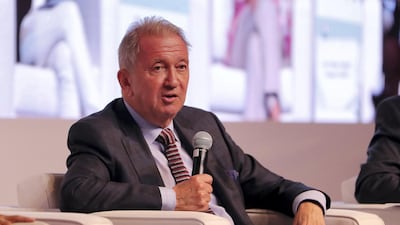States in the Middle East and North Africa must be prepared to “speak to their enemies” if they are to secure peace, a senior former diplomat has said.
Terje Rød-Larsen, a Norwegian who was a key figure in brokering the Oslo Accords between Israel and Palestine in the 1990s, said the region was the “least organised and least integrated in the world” but that efforts to establish lines of communication between rival governments had been unsuccessful.
He said that a “new fault line” had emerged, between the UAE, Saudi Arabia, and their allies on one side, and Iran and its friends on the other. This was now the primary issue of concern among the region’s governments, he said, leaving even the Israel-Palestine dispute “pushed to the margins”.
He made his comments in a discussion at Diplocon, a conference organised by the Emirates Diplomatic Academy in Abu Dhabi.
“The whole geo-political landscape of the Middle East has changed quite fundamentally,” said Mr Rød-Larsen, who is President of the International Peace Institute. “Unfortunately, the Palestinian issue has been pushed to the margins of the focus in the region.
“The Middle East and North Africa is the least organised and least integrated region in the world. It is also the only region in the world where not all parties are sitting at the same table. There’s no table where you have all the Arabs, Turkey, Iran and Israel.
_________________
Live coverage of Diplocon:
Nations must break up the diplomatic boys' club, UAE summit hears
Gargash: in the 15-minute news cycle, we can't afford to ignore criticism
Hundreds to attend Abu Dhabi's diplomatic convention
We need to break the diplomatic glass ceiling, UAE academy chief says
_________________
“There’s no point in only speaking to your friends, you need to speak to your enemies to resolve conflicts. I think this is a flaw and something should be done about it. Many of my Arab friends actually have taken initiatives in this regard but it doesn’t fall on fertile ground.
“The most important thing to do now is to create a situation where there is better co-operation in the region.”
Mr Rød-Larsen also recalled his time as a negotiator with the UN, seeking to secure Israel’s withdrawal from Southern Lebanon. With the backing of Kofi Annan, UN Secretary General and his boss at the time, he was forced to take a tough line with Tel Aviv.
He recalled a dispute between Israel and Lebanon over a tomb on the border, which both sides claimed as a holy site. A compromise, where people from both countries would be able to visit, was undermined when Israel “bulldozed” a hill so the tomb would be inaccessible from the Lebanese side.
“I called my Israeli military counterparts and asked for a meeting. They were laughing at me, saying ‘OK, but we’ve already done it, what can we do?’
Mr Rød-Larsen threatened to make sure the Security Council would not recognise an end to the Israeli occupation of Lebanon.
He received a call from the Israeli Prime Minister, who he said told him that he would have him fired if he pushed for the rebuilding of the hill.
“He asked Kofi Annan to fire me because of the hill. But, they rebuilt the hill.”
Israel eventually did withdraw from Lebanon in 2000.

